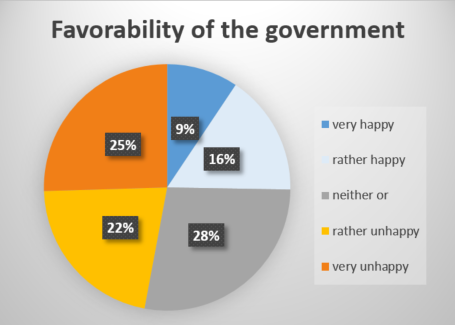As Parliament convenes after the Christmas recess, the new majority in parliament, formed by the small centrist party Bright Future, the center-right Restoration and conservative Independence Party is in for a tough time. The majority has a narrow one MP majority in parliament and the coalition government formed by the majority parties, which assumed power on January 11, enjoys historically low support. Only 25.3% of voters are either pleased or very pleased with the government, while 47% were unhappy.
A poll conducted by the polling firm Maskína revealed that the coalition government of the conservative Independence Party, centre-right Restoration and centrist Best Future is only supported by voters on the right. It enjoys the support of just 77-79% of the voters of the Independence Party and Restoration, and only 31% of the voters of Bright Future which ran on a centrist platform in the October elections.
Read more: Analysis: The clouds of the Panama Papers hang over new coalition government

The poll revealed that while 9.4% of voters were very happy and 15.9% were somewhat happy, with the coalition government, 25.5% were very unhappy and 21.6% were somewhat unhappy. Men and people with higher incomes are more likely to be happy with the government, although the favourability only rises to 32% in the highest income group.
Historic unpopularity
Gunnar Smári Egilsson, a local political commentator and editor of the newspaper Fréttatíminn, points out in a post on Facebook that this is the lowest favourability rating any government has registered since at least the turn of the century. Even the governments of Geir H. Haarde, which was in power when the financial system crashed in 2008, and the government of Sigmundur Davíð Gunnlaugsson, who resigned after the revelations of the Panama Papers in April 2016, had higher favourability ratings.
After the Panama Papers scandal the government of Sigmundur Davíð never dropped below the 30% threshold, enjoying a 30.9% favourability rating at its lowest point. The least popular government since 2000 was that of Geir H. Haarde which was in power when the financial crisis hit. When it left office it still had a 26% favourability rating.
As Parliament convenes after the Christmas recess, the new majority in parliament, formed by the small centrist party Bright Future, the center-right Restoration and conservative Independence Party is in for a tough time. The majority has a narrow one MP majority in parliament and the coalition government formed by the majority parties, which assumed power on January 11, enjoys historically low support. Only 25.3% of voters are either pleased or very pleased with the government, while 47% were unhappy.
A poll conducted by the polling firm Maskína revealed that the coalition government of the conservative Independence Party, centre-right Restoration and centrist Best Future is only supported by voters on the right. It enjoys the support of just 77-79% of the voters of the Independence Party and Restoration, and only 31% of the voters of Bright Future which ran on a centrist platform in the October elections.
Read more: Analysis: The clouds of the Panama Papers hang over new coalition government

The poll revealed that while 9.4% of voters were very happy and 15.9% were somewhat happy, with the coalition government, 25.5% were very unhappy and 21.6% were somewhat unhappy. Men and people with higher incomes are more likely to be happy with the government, although the favourability only rises to 32% in the highest income group.
Historic unpopularity
Gunnar Smári Egilsson, a local political commentator and editor of the newspaper Fréttatíminn, points out in a post on Facebook that this is the lowest favourability rating any government has registered since at least the turn of the century. Even the governments of Geir H. Haarde, which was in power when the financial system crashed in 2008, and the government of Sigmundur Davíð Gunnlaugsson, who resigned after the revelations of the Panama Papers in April 2016, had higher favourability ratings.
After the Panama Papers scandal the government of Sigmundur Davíð never dropped below the 30% threshold, enjoying a 30.9% favourability rating at its lowest point. The least popular government since 2000 was that of Geir H. Haarde which was in power when the financial crisis hit. When it left office it still had a 26% favourability rating.






